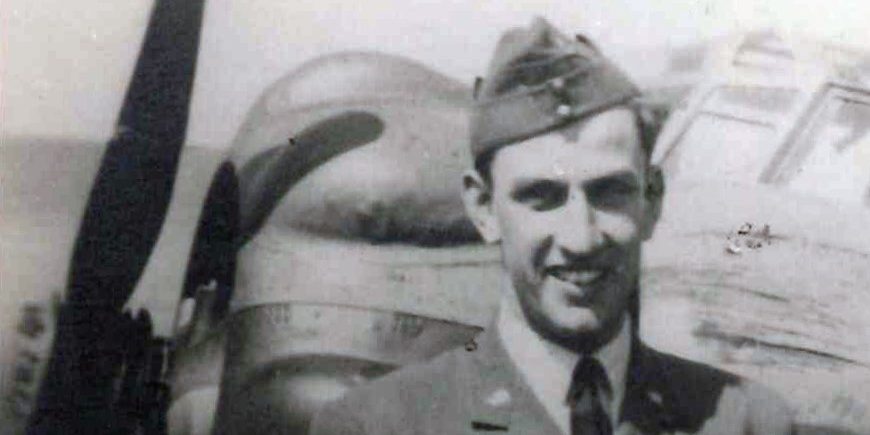Today marks the 78th anniversary of the death in action of Dan Arkell, Bloxham School’s greatest pre-war rugby player and member of the 1st XV for five seasons
To be appointed Captain of Rugby while also being School Captain (Head of School) is a rare honour but Dan Arkell is unique in that he was captain of the Bloxham School 1st XV not for one season but for three, holding the captaincy between February 1931 and December 1933. Arkell was the outstanding player in the school’s pre-war rugby history, and it is tempting to speculate what might have been if his life had not been claimed in the Second World War. Today, 14th April, marks the anniversay of his death in action during the Second World War.
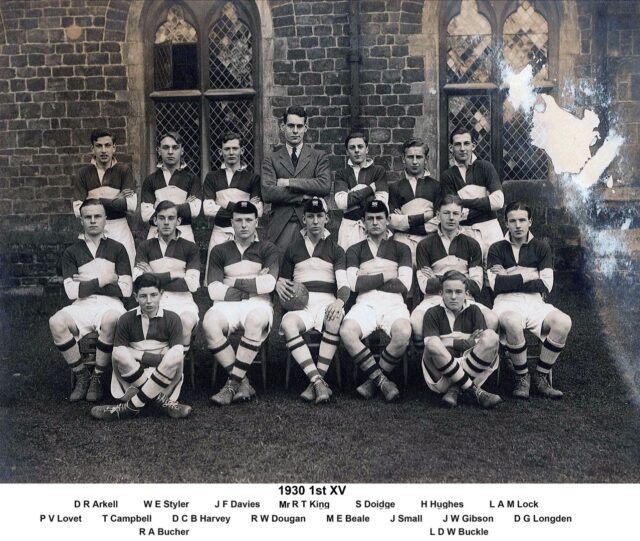
Daniel Richard Arkell (always known as Dan) was born on 3 January 1915 and started at Bloxham as a boarder in Crake House in September 1928. At this point the school had only been playing Rugby for eight years, as it was a football-playing school for the first sixty years of its existence. The first match was played in March 1920 against Warwick School, who unsurprisingly won convincingly (35-0), and wins were hard to come by at first, with the The Bloxhamist admitting ‘We have lost matches it is true, but then we expected to lose matches, and we must expect to lose many more before we finally establish ourselves in this new code.’ The School’s first victory came in 1922, against King Edward VI, Stratford.
Dan quickly made an impression on the games field at Bloxham, winning the 100 yards and quarter mile as well as the Long Jump on Sports Day in June 1929. He made his first appearance for the 1st XV while still only 14 years of age, playing the entire 1929-1930 season at fly half and gaining his full colours (in those days Bloxham played rugby in both the Michaelmas and Easter Terms, so seasons spanned two calendar years). The Bloxhamist praised his handling but observed that ‘he is liable to kick when it would be better to open up an attack.’
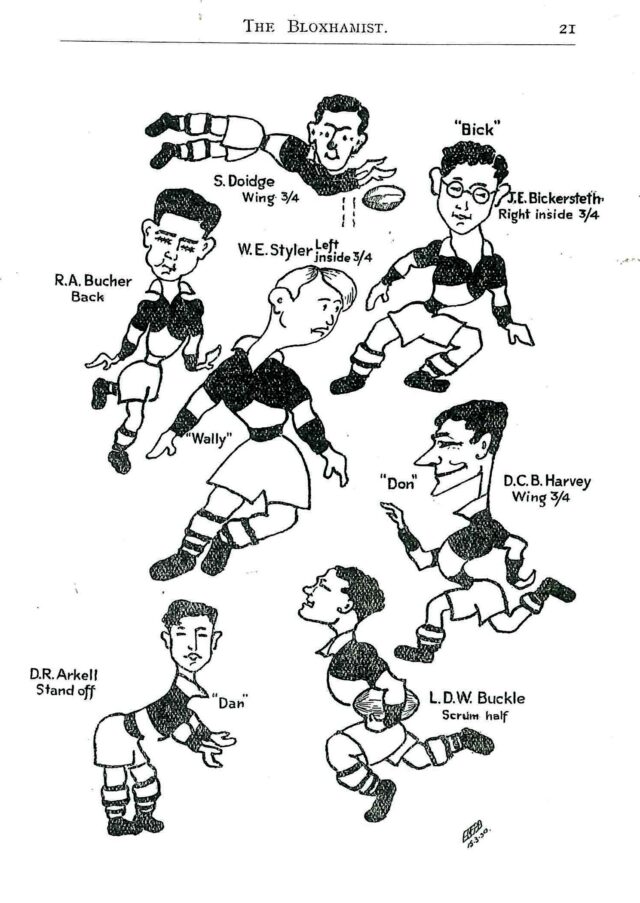
The following season (1930-31) he again filled the fly half position in the early part of the season, showing outstanding form in a memorable 21-0 win over Abingdon, but with three key members of the side having left at Christmas, it was decided to move him into the centre to give a new fly half some experience in that position.
The Bloxhamist expressed the hope that ‘events next year will banish possible regrets and prove the wisdom of the step,’ but results suggest that the experiment was a failure, with only one game out of six being won after Christmas. For the game against Oxfordshire Nomads, one of several club sides on the fixture list at the time, the captain, D Harvey, was missing, having suffered an injury to his thumb boxing the previous night; Arkell captained the side for the first time and scored two tries in an 11-9 win. Having made such a good impression leading the side just a month after his 16th birthday, he was the obvious choice as captain the following season. At this point in his career, The Bloxhamist adjudged him ‘a straight, resolute runner, with good hands, but needs to get quicker off the mark. A good kick with either foot and good place-kick anywhere near goal.’ His defence was described as ‘good, except that he has yet to learn the low, hand tackle.’
The side which Arkell captained in the 1931-1932 season was a young and inexperienced one. The Bloxhamist judged Arkell to have been a little nervous as a captain, but complimented him on the amount of work he got through. He had been restored to his old position at fly half and was now the team’s place kicker as well. In the eighth game of the season, against Northampton School, Bloxham suffered what the school magazine called ‘our one calamity of the season, Arkell tearing a muscle in a tackle after ten minutes.’ In those days there was no such thing as a replacement for an injured player ‘ he was forced to stay on the pitch on the wing, doubtless making his injury worse. He would miss the next four games, and the side predictably struggled without him. The final tally for the season ‘ six wins, seven losses and a draw ‘ exceeded expectations and included good victories over Abingdon, MCS Oxford and King’s, Worcester. Still, Warwick had never been beaten, winning the 1932 fixture 29-3.
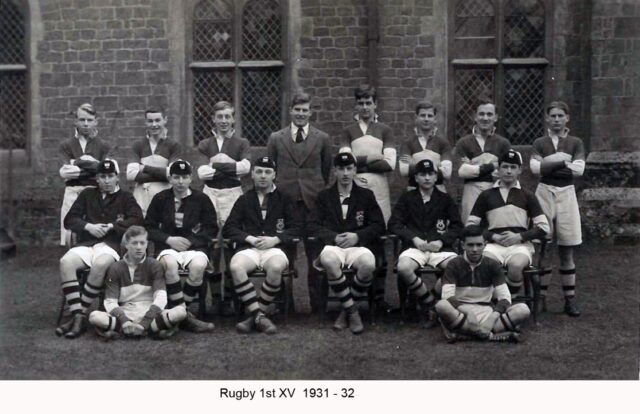
Back for his fourth season in the 1st XV in 1932-1933, Arkell once again captained the side (he was by now School Captain as well). Missing his half back partner of the previous season, Houghton, Arkell found himself shouldering the burden alone, topping both the try scoring and points lists. Results were disappointing (won 5, lost 8, drawn 1) but the season contained one great moment in the shape of the school’s first victory over its oldest rival, Warwick, which came in dramatic circumstances. With the scores level at 3-3 and time running out, Arkell received the ball near his own line, punted ahead, caught and robbed the full back on the half-way line, dribbled on, picked up and crashed over in the corner for the winning score.
He was now 18, and ordinarily he should have left Bloxham at the end of the year along with his peers, but he had been taken ill the week before he was due to go up to Oxford to compete for a History Scholarship. Recording his bad luck, The Bloxhamist for March 1933 remarked that ‘he has our sympathy but it is, perhaps, a little insincere. Will he be back in September for another Rugger season?’ Sure enough, September 1933 saw him back for another attempt at Oxford and a remarkable fifth season in the 1st XV. ‘Now playing in the centre and captaining an inexperienced side with a small set of forwards, Arkell was praised by The Bloxhamist ‘for the way he raised such a side from extreme mediocrity to something like our usual standard.’ In a one-point defeat against MCS Oxford he kicked a drop goal with his left foot, while against Abingdon he was in outstanding form, scoring three tries in a 39-0 victory. In his last school match, an 11-3 win over Warwick, he repeated the heroics of the previous year, moving to scrum half when injuries elsewhere demanded it and causing The Bloxhamist to conclude that ‘it was Arkell’s generalship that did most towards repeating last year’s win.’
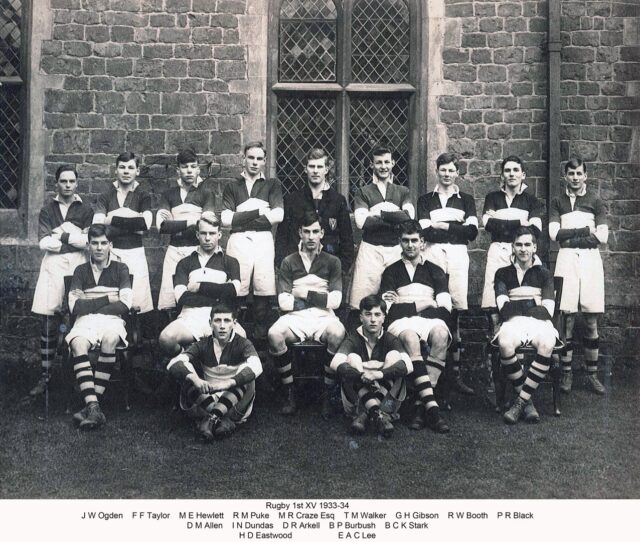
He also represented the school at cricket, playing for the 1st XI for three seasons as a batsman and an outstanding fielder, heading the batting averages in his final season. He left Bloxham School at the end of the Christmas Term 1933, having been School Captain, 1st XV Captain, Company Sergeant Major of the School OTC and Captain of Boxing.
Unsuccessful in his attempt to win a place at Oxford, Dan decided to plunge into the world of commerce, working for Guthries, East India Merchants, as a clerk on the London Rubber Exchange. While working in London, he played for Rosslyn Park, then one of the leading clubs in the country, becoming a 1st team regular between 1936 and 1939 and playing alongside the England wing Jim Unwin, one of the stars of the 1938 British Lions in South Africa.
Having played at fly half or centre at school, Arkell was now a full back; if press reports are to be believed, he was a promising player ‘ against London Scottish in January 1937, the Times reported that ‘Arkell’s kicking was safe, and his tackling was particularly noteworthy.’ Against the Old Blues in March 1938 he was said to have ‘had a lot of harassing moments, and though he never looked very safe he generally managed to survive by the skin of his teeth.’
By 1939 he had been joined in the Rosslyn Park back division by one of the stars of the game, the England international Alexander Obolensky. Arkell wore the number 1 on his shirt and Obolensky number 2 (in those days shirt numbers went from 1 for the full back to 15 for the prop, the exact reverse of today). Obolensky was an exotic character, a Russian prince who had been born in St Petersburg in 1916, his family fleeing Russia after the Revolution of 1917. Unlike Arkell, he had gone on to Oxford University after leaving Trent College, winning two Blues as well as scraping a Fourth-Class Degree. He made his debut for England in January 1936 in a 13-0 victory over New Zealand. The second of his two tries that day is still regarded as one of the greatest in the history of the game, involving as it did a spectacular run, beating numerous All Black defenders. ‘You can judge for yourself:’https://www.youtube.com/watch?v=tGtdxuhjcqI
These were momentous times ‘ Dan’s last year at Bloxham coincided with the coming to power of Hitler in Germany and President Roosevelt in the USA as well as the height of the Great Depression. By the end of the decade war clouds were gathering, and Dan was typical of young men of his social circle in joining the London RAF Volunteer Reserve. His final game for Rosslyn Park came in December 1939, against St Barts, by which time the Second World War was already three months old. Obolensky missed that match, having already joined the RAF. On 29 March 1940, a day after being recalled to the England squad to play Wales, Pilot Officer Obolensky was killed when his Hurricane crashed during landing after a training flight, breaking his neck.
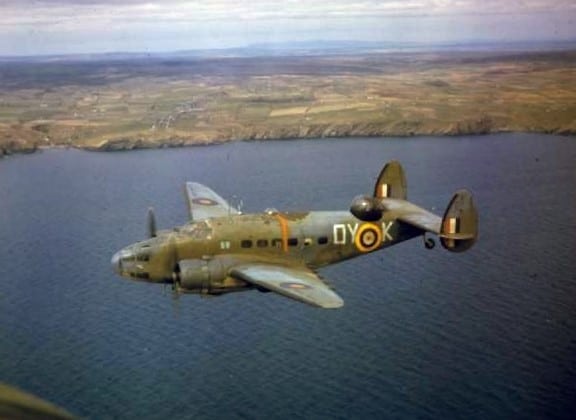
Dan Arkell also joined the RAF at the outbreak of war, becoming a Pilot Officer in April 1941. Whereas Obolensky had joined Fighter Command, Arkell was sent to Coastal Command, learning to fly a Lockheed Hudson, the light bomber employed by 48 Squadron for anti-submarine patrols. In the early hours of 14 April 1942 Flight Lieutenant Arkell was piloting Hudson AN730, which took off on night operations at 02:35 a.m. from RAF Wick, at the north-eastern tip of Scotland. The aircraft was seen to climb away after take-off very steeply, then stalled and crashed hitting the ground at right angles to the direction of take-off, with the right wing striking the ground first. Dan Arkell and the other three members of the crew were all killed.
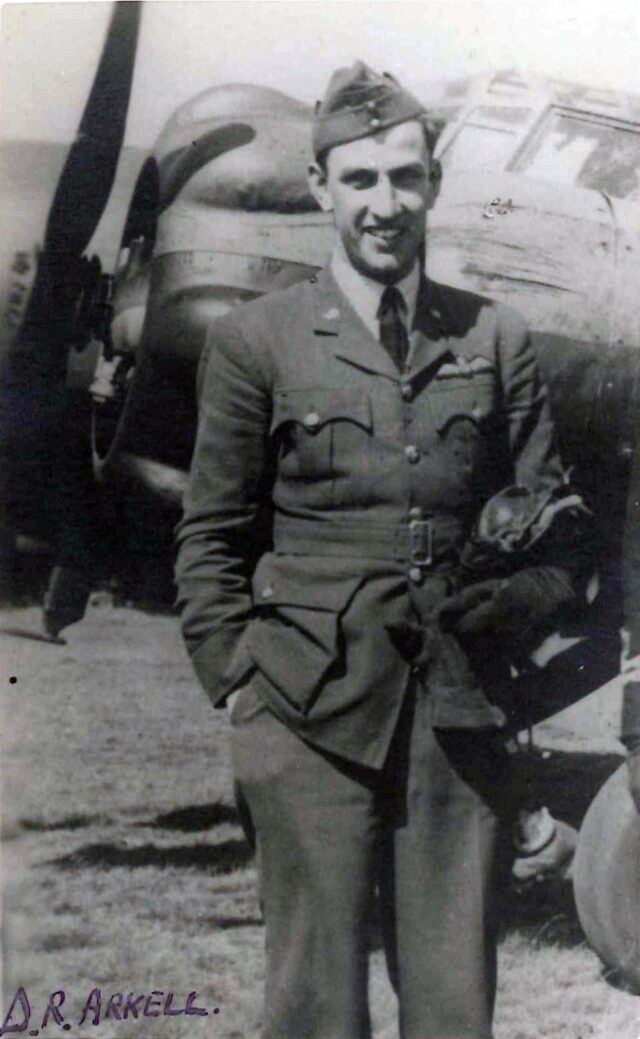
His body was brought back to Cheltenham for cremation. He left his parents, who lived in Lechlade, to mourn his loss as well as a young wife, Betty. Dan Arkell was clearly an exceptional sportsman and a remarkable young man who in the course of his short life showed great potential for leadership. He was, sadly, one of five members of the 1933 Bloxham 1st XV who perished in the Second World War.
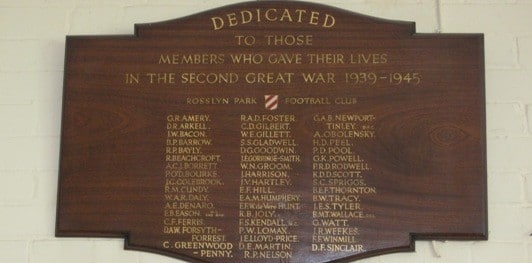
I am indebted to David Whittam, the Archivist of Rosslyn Park FC, for his assistance in writing this article.
Simon Batten, School Historian


